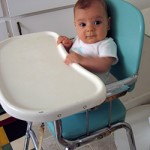One of the most useful and potentially amusing features of English is that the rules allow us to pile up words in an almost endless series, and it is impossible to know which word is modifying which. I say useful, because it allows the user to say one thing and mean another. Here is a perfect illustration.
We were having breakfast at our favorite Bacon ‘n’ Egg (note the careful use of apostrophes). A family with a grumpy toddler was being seated at the next table. “Brendan, don’t you want to sit in The Big Boy Chair?” the dad asked the toddler in his best condescending parental voice.
The toddler brightened up and allowed himself to be lifted into the wooden high chair, assuming that Dad’s name for it meant The Chair for Big Boys. And not, what we all know it to be, the Big Chair for (little) Boys (or Girls). Such is the beauty of ambiguous English. We can pile up words, and there is no way to tell which ones are connected together. When Dad says Big Boy Chair, is it a Chair for Big Boys, or a Big Chair? It means whatever you want it to mean.
Now you have a clue why legal documents, like the Terms of Service for Facebook, are so darn complicated. The lawyers are trying to make English more specific by spelling out every little nuance of every little phrase. They don’t seem to notice that the more words they use, the more opportunities arise for them to be connected in ambiguous ways. It is hopeless, really, to be precise in English.
Suppose you see an ad for The Magic Carpet, described as:
an epic hair curling roller coaster.
Your first impression is that it is for an amusement park ride that is so thrilling it curls your hair.
But it turns out to be a special insulated mat, on which you can safely place the heated rollers you use for curling your hair, a coaster for hair rollers. Magic Carpet indeed.
I propose that we start using parentheses in English, the way we use them in math.
12 + 7 x 4 could be 76 or 40, depending on the order of operations. So if you want to always be clear you mean 40, you’d write
12 + (7 x 4) instead of (12 + 7) x 4
In a similar way we ought to group together words that are related with parentheses, so that we are certain which words modify which.
I am a stupid English blog writer.
becomes
I am a (stupid English) (blog writer).
That way you know I mean that English is stupid, and not my blog. Or perhaps the meaning you prefer would be stated
I am an English blog (stupid writer).
